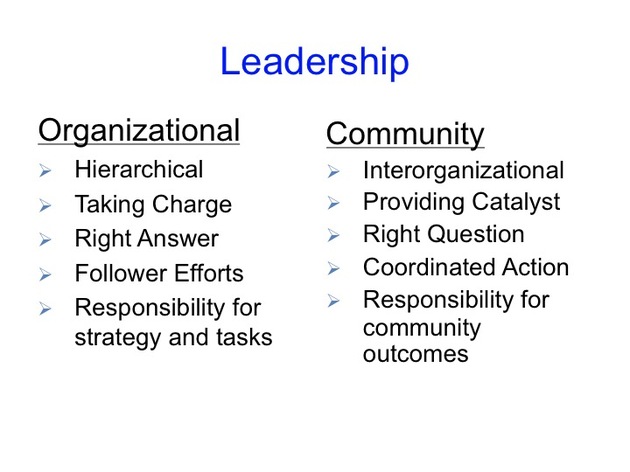
The catalytic leader is the first to ask, why can’t we achieve what we want? The catalytic leader is the first to start working differently.
A catalytic leader is someone who can communicate across organizations and sectors to inspire a new way of working that will achieve the community’s highest aspirations. A catalytic leader knows how to hold the center [Habit #3] and put community outcomes before personal or organizational agendas.
Some catalytic leaders start the process by asking key questions and convening people to explore this new approach. Some catalytic leaders support the ongoing process of implementation. Catalytic leadership exists in individuals (for example, in executives or board members) and in organizations (for example, local companies, community foundations, county government, or chambers of commerce).
Though the primary motivation for becoming a catalytic leader should be to help your community solve problems and achieve its goals, you can expect some benefits from taking on this role. For example, you will gain a big-picture understanding of your community and connect to hundreds of people. You will help shape your community’s future. And your organization may reap financial rewards for ensuring that resources are solving problems.
Of course, becoming a catalytic leader also has risks. When you ask the community what it wants, you don’t know what answers you’ll get. Acting on those answers may require significant change in your organization’s operations.
Do you want to learn how to be a catalytic leader? Alas, you will find few tools to help. At least 90 percent of the books on leadership and management are about organizational leadership. But an organizational leadership model doesn’t serve us well when we are working at the community level. The chart below contrasts the two type of leadership styles. You will recognize the familiar characteristics of the "organizational leader style." Now that you've deepened your understanding of Working Differently, you can see how so many of the leadership traits we took for granted are inappropriate for achieving collective impact.
(A great team or board exercise is to discuss the key differences in styles and check how you have been operating -- you will quickly see how the wrong leadership style will clearly undermine your ability to achieve collective impact).
Organizational leaders are expected to take charge of processes, develop a strong sense of ownership, inspire others with their vision, answer the tough questions, and defend the organization’s interests.
Conversely, catalytic leaders let the process develop through community conversation, avoid developing a sense of ownership, help the community develop its own vision, and ask the tough questions. Most importantly, catalytic leaders must be and be perceived to be neutral about the agendas of individual organizations and people. They must also be and be perceived to be responsible for keeping everyone focused on the community’s outcomes and holding everyone accountable.
Catalytic leaders often convene meetings, get more people engaged, keep information flowing, and make sure tasks are completed between meetings. Therefore, they can be erroneously perceived as owning this community endeavor. But they must actively shun that perception. Community work needs someone to push and lead everyone forward, but the endeavor and the results must be owned by everyone. If an educated workforce becomes “the chamber’s pet project,” it will lose the necessary involvement of every sector. If ending homelessness becomes “the county’s shelter project,” the commitment to work differently across organizations is lost.
To be tweeted links to my new posts -- blog, book reviews (both nonfiction and fiction), data or other recommended tools -- either go to Twitter.com and follow me @jcrubicon, or just go to my Home page and click on the Twitter button on the right, just above the tweet stream, and follow me @jcrubicon.
 RSS Feed
RSS Feed
